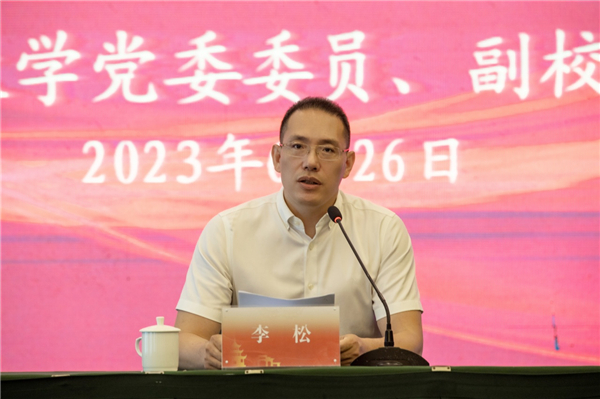On 25-27 June 2023, the Open University of China (OUC) held a biennial meeting for centralized deployment of quality management in Anshun City, Guizhou Province. The event was hosted by Guizhou Open University (OU).
Dong Zhenhua, director of the Higher Continuing Education Division of the Department of Vocational and Adult Education, Ministry of Education (MOE), provided specialized guidance via video. Li Song, a member of the Party Committee and vice president of the OUC, attended the meeting and delivered a keynote report. Song Guangqiang, secretary of the Party Committee of Guizhou OU, and Luan Yan, vice mayor and member of the Leading Party Group of Anshun City People’s Government, delivered speeches at the venue. The meeting was chaired by Han Yi, director of the OUC Department of Quality Monitoring and Control.
The theme of the meeting is "Following the Guidance of Xi Jinping Thought on Socialism with Chinese Characteristics for a New Era, Building a New Development Pattern for Quality Governance in Open Education, and Contributing to the Construction of a Leading Country in Education."
Dong pointed out that continuing education is an integral part of the national education system and a crucial foundation for lifelong learning for all. It is imperative to deepen the understanding and implementation of the guiding principles of the 20th National Party Congress and General Secretary Xi Jinping's important instructions on continuing education. It is essential to fully implement the new requirements of the Party and the state regarding the high-quality development of continuing education, firmly establish the awareness of the "quality lifeline," and effectively implement all the management systems released by the MOE. The focus should be on standardizing specialty offerings and the registration of teaching centers outside the university, strengthening the comprehensive management of operations across the entire chain and process, and organising the implementation of "the strategic project of building a learning society" and the teaching reform and innovation project in continuing education. These efforts will promote the high-quality development of open education.

Li Song delivered a keynote report titled "Working Collectively and Creating Excellence to Contribute the Open University's Strength to the Building of a Leading Country in Education." With the aim of building a leading country in education and developing open education that meets the expectations of the people, the OUC made deployments in three aspects: establishing a new quality concept for the open university in the new era, building a new development pattern of quality governance, and comprehensively improving the quality of talent training.
Han Yi outlined the requirements for implementing the tasks proposed by the MOE expert and the university's leadership. Firstly, it is necessary to implement The OUC Comprehensive Reform Plan to strengthen the quality culture of the OUC. Secondly, a scientific evaluation and comprehensive supervision based on three years of data should be conducted to establish a long-term mechanism for achieving excellence and improving quality with a digital mindset. Thirdly, coordination across the entire education system is needed to form a more comprehensive closed loop of quality governance network.
The event provided guidance from five perspectives: the roles of study centers in schools, the responsibilities of leaders in the functional department of quality management, the focus of university leaders on the long-term effects of quality governance, the comprehensive improvement initiatives of the OUC branch system, and the cultural values of hard work and entrepreneurship that the OUC personnel should uphold. Seven OUC branch leaders were invited as guests to share their experiences, gather strength, boost morale, and promote the cultural spirit of hard work, entrepreneurship, adherence to fundamental principles, truth-seeking, responsibility, perseverance, and progress.
This event represents a new stage in the OUC education system's transition from quality management to quality culture building in terms of quality governance. The representatives engaged in a lively discussion on harnessing the full potential of the OUC quality culture. They explored topics such as establishing a closed loop of quality governance, achieving tangible results through self-examination and self-correction in the face of challenges and difficulties, and more.
A total of approximately 180 individuals attended the meeting, including officials from the relevant teaching management departments at the OUC headquarters, university leaders overseeing quality work from 45 branches, 44 representatives from related schools and study centres, as well as leaders responsible for quality work from 16 industry and cooperative colleges and specialized schools.
By He Dandan, OUC